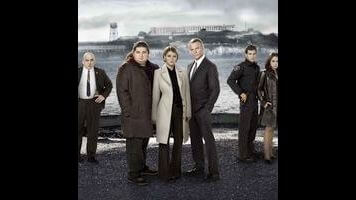Alcatraz: “Johnny McKee”

Every new series has its growing pains, struggling to shrug off the less-successful elements of its pilot while still building on the bits that worked from the get-go, but you can usually tell when a series has hit the point where the producers have finally figured out the formula they were looking for all along. Maybe it’s a bit optimistic to say so, but it certainly seems like “Johnny McKee” might be that episode for Alcatraz.
First and foremost, things kicked off this evening neither with a flashback nor a look into one of the returning ‘63s but, rather, with Hauser visiting Lucy in Dr. Beauregard’s facilities. It’s not the most eventful visit as far as Hauser’s concerned, as her condition remains unchanged despite Beauregard’s best efforts to rouse her, but it was a scene that started out intriguing and became even more so by the end of the episode. Apparently, Lucy isn’t waking up because her mind believes that the dreams she’s dreaming are better than whatever awaits her in the real world, a fact which leads Beauregard to suggest that the sound of Hauser’s voice might help bring her back. “She needs a reason, sir,” says the doctor. “Love is a good one.” Perhaps so, but the mere idea causes Hauser to hem, haw, and ultimately head out of the infirmary, leading Beauregard to ask, “What are you afraid of, Emerson?” The question goes unanswered, but as we learn later, it does not go unconsidered.
Okay, now it’s time to check in on our ’63 of the week. When we first see Johnny McKee, he’s behind the bar of some trendy-looking Chinatown nightclub, doling out drinks with a side of Jules Verne, but when a mouthy patron comes up and gives him a bit of lip, he’s straight over to whip up a poisonous concoction. Cue the first flashback of the evening, where we’re witness to McKee being asked by fellow inmate Mikey Cullen to off the prison librarian, a “squirrely mug” who’s screwing up the status quo by distributing shivs in the spines of certain library books. McKee’s not particularly interested, but when Cullen growls, “You don’t want to say ‘no’ to me,” McKee shrugs and says, “I guess every schoolyard’s got a bully.” True enough. When we jump back to the present, we discover for the first time—but not the last—that McKee’s gift for chemistry provides him with a perfect method for dispatching any bullies that cross his path. As the mouthy patron and his pals endure the effects of what’s become their final beverage, McKee calmly folds his apron, sets it on the bar, and strolls off to find another job.
Back at Alcatraz HQ, we discover that the gang has got a search engine set up to troll YouTube for the sudden appearance of videos that might relate to ‘63s, then scan them with video-recognition software to identify any Alcatraz inmates and guards contained therein. Lo and behold, some quick-moving soul with an iPhone has captured the last moments of McKee’s victims as well as a shot of the man behind their demise, calling it “Freaky Deaths at Club.” (By the way, I question if even Hauser’s seemingly lengthy reach can do away with every single appearance of a video that’s gone viral, but I admire that the show is at least attempting to address that they’re trying to keep the ‘63s and their crimes under wraps.)

 Keep scrolling for more great stories.
Keep scrolling for more great stories.